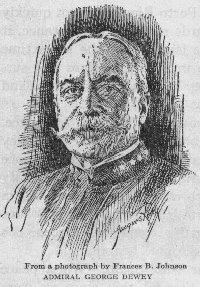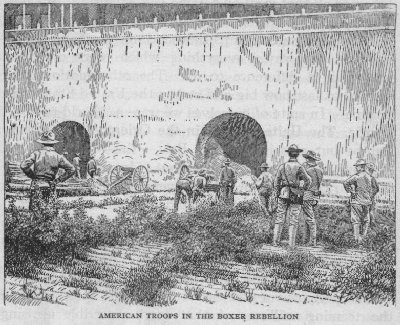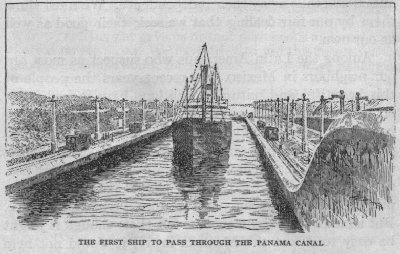161. Results of the War with Spain. When peace came, some of our citizens thought that since we were a republic we cught not to have colonies and to rule over subject peoples. But President McKinley and the majority felt we could not give up what the war had brought us. They believed that Porto Rico was too small and the people of the Philippines were as yet too backward to be independent. So ever since, we have kept the Philippines and Porto Rico, though, unlike many European nations, we have tried to rule our possessions for the good of their own inhabitants rather than for our own selfish gain. We have said that as soon as the Filipinos are able to manage the affairs of their islands in a civilized way they shall rule them themselves. But they must prove first that they are capable.
As to Cuba, the United States, to the great astonishment of many Europeans, stood bravely by the promise  we gave when the war with Spain began. It took some time, indeed, before good order could be restored in that beautiful island after so much confusion. But in the end all American soldiers were, withdrawn, and the Cubans were left to the rule of their own elected officers. Among all the great things our nation has done, this act is not the least.
we gave when the war with Spain began. It took some time, indeed, before good order could be restored in that beautiful island after so much confusion. But in the end all American soldiers were, withdrawn, and the Cubans were left to the rule of their own elected officers. Among all the great things our nation has done, this act is not the least.
The war with Spain made a great difference in the position of the United States in the world. It taught us that it was no longer possible for us to keep entirely to. ourselves and have nothing to do with the affairs of other continents. We saw, indeed, how happy we had once been when we could disregard all that went on beyond the Atlantic. But now that the ocean could be crossed in a few days, and instead of a few score sailing ships thousands of merchant steamers plied the waves, everything which went on Over.. seas made a difference to us. The other nations also realized at last how big and strong the United States had become In spite of ourselves we were a "world power."
162. The United States in the Orient. Not only In Europe but also in the Far East— the "Land of the Morning"— we began to reach out. In 1898 the beautiful and rich Hawaiian Islands were annexed. Later, by peaceful agreement with England and Germany, a part of Samoa, came under our rule. And meanwhile we were kept very busy in the Philippines, where the Filipinos at first rebelled against our control and were subdued by American troops only after many hard campaigns.
But perhaps our greatest work came in China. Among the teeming millions of that land a terrible uprising against all Europeans and Americans took place—the "Boxer Rebellion, " it was called. The people, poor and ignorant, believed that the "foreign devils" wanted to ruin China; so they murdered the German minister and some missionaries. All the white residents in Peking would have been slain, but they took refuge in the British Legation and defended themselves bravely while they waited for help to come.
With all haste the great powers of the world sent troops to rescue their people. And among all the soldiers who marched to save those in danger none fought more bravely or toiled more doggedly than our boys in khaki. The rescuers burst into Peking in time to save the besieged; with the Boxers defeated, the rebellion was 
at an end. The Chinese government begged for mercy. To punish China the other nations seized land and
levied an enormous fine. But the United States would not take part in robbing a nation whose main fault was its ignorance. When China prepared to pay us our share of the money our nation, at the suggestion of President Roosevelt, would take only enough to cover the real damage we had suffered. The balance of the money we gave back to China who used it to send Chinese students to schools in America.
And the Chinese were grateful. They saw that they had one friend. They will not forget.
Later the people of China determined that they would no longer have so weak and backward a government as that of their emperor. They took the power away from him and declared they would be a republic. They thought that nowhere in the world were the people so happy as in the United States. It has been hard for them to imitate us in a land so different. But all Americans hope that the new Chinese Republic will soon learn self-government, and become one of the world’s leading powers.
163. Our Problems in America. On our own continent, too, we have had much to do since the war with Spain. First, urged by our tireless President Roosevelt, we set to work to build the Panama Canal through the isthmus which joins North and South America. To cut the mountain range which separates the waters of the Caribbean Sea from the Pacific was indeed the task of 
a giant, and one which had already baffled the skill of the most celebrated European engineers.
There is no or more interesting story than that which tells how in spite of almost insurmountable obstacles the "Big Ditch" was at last opened to the commerce of the world. It is a gift from America to all humanity.
The Panama Canal has brought us hundreds of miles nearer to many of the chief ports of South America. More than ever it strengthens our interest in our sister republics to the south. It has long been our policy to have all the free nations of North and South America join in a common friendship and in common action when the interests of all are concerned. This idea is called "Pan-Americanism." It is to be hoped it will grow constantly stronger.
But not all of the people of Latin America are in favor of acting with us. Some of them are afraid that the United States, which is so big and strong, will interfere in their affairs and take away their independence. We must show them by our fair dealing that we seek their good as well as our own.
Among the Latin Americans who suspect us most are our neighbors in Mexico. In recent years the people of this beautiful and naturally rich land have indeed fallen on evil days. Since 1911 one revolution after another has swept their country until it has nearly been ruined.
In these conflicts many Americans have lost their property and many have been slain. Some of our citizens, therefore, think that we should invade Mexico, punish the wrongdoers, and restore permanent peace. But so far our government has felt that, though it might be easy to defeat the Mexican army, it would not help either our neighbors or ourselves to add one war to another. It is to be hoped that the people of Mexico will finally settle their quarrels and become once more a quiet and progressive nation.
These and many other matters have in recent years demanded the serious thought of our people. But they were as nothing when compared with new problems which began to confront us in Europe.
SUGGESTIONS INTENDED TO HELP THE PUPIL
The Leading Facts. 1. The people of the American colonies, though not all of English blood, regarded England as their mother country. 2. The tyranny of King George III drove the people of America to rebel against England. 3. France helped us win our independence from Great Britain. 4. At first we wanted to separate ourselves entirely from Europe. 5. Washington and other early Presidents believed in the policy of "neutrality." 6. By the Monroe Doctrine the United States declared that European nations must not interfere in the American hemisphere. 7. Our first immigrants easily became Americans. 8. The "New Immigration" has brought us hard problems. 9. After the War of 1812 our country for a long time had no serious difficulties with Europe. 10. The failure of Spain in Cuba caused the Spanish-American War. 11. This war gave us distant possessions and made us a "world power." 12. We have tried to use this power for the good of the whole world; for instance, in such ways as digging the Panama Canal and helping China. 13. We are trying to bring together the nations of North and South America by "Pan-Americanism." 14. Our work in America was interrupted by "Old Europe".
Study Questions. 1. What colonies had many non-Eng11th people? 2. Why did they become like the English? 3. Why did the colonists rebel against their mother country? 4. What is "our debt of gratitude to France"? 5. Why did Washington think that we should keep out of wars and alliances with Europe? 6. Why was it hard to follow this policy? 7.. Why is the Treaty of Ghent important? 8. State the Monroe Doctrine. 9. What were the causes of Monroe’s message? 10. Has the Monroe Doctrine had good or bad results? 11. What is meant by the "Old Immigration"? 12. Why do you think it has been a good thing for the United States? 13. What is meant by the "New Immigration"? 14. Why is it "a problem"? 5 Who was Maximilian? 16. What was the Geneva Tribuna. 17. Why did we have a war with Spain? i8. Why is it said that this war was "won by the navy"? 19. Explain what we did with Cuba; Porto Rico; the Philippines. 20. How can it be said that "the world is growing smaller"? Why are the Chinese our friends, when our troops helped to take their capital? 22. Why did we want to dig the Panama Canal? What were some of the difficulties? 23. What is "Pan-Americanism"? 24. Why was there trouble with Mexico?
Suggested Readings. Foster, A Century of American
Diplomacy; Andrews, The United States in Our Own Times;
Hart, American History Told by Contemporaries, Vol. IV;
Abbot, Panama and the Canal; Latané, From Isolation to Leadership; Roberts, The New Immigration; Steiner, Nationalizing
America; McLaughlin, History of the American Nation; Mace,
School History of the United States.
Next Chapter
Back to Table of Contents.
© 2001 by Lynn Waterman